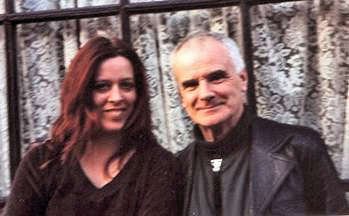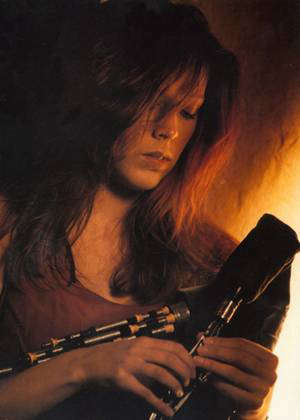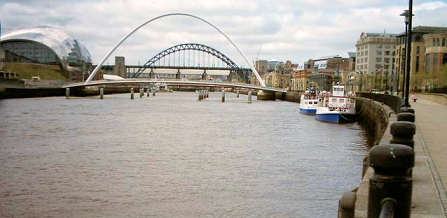|
Editorial Board
Melanie
Eskenazi
Webmaster: Len Mullenger
|
Seen and Heard Concert Review
World Premier - Peter Maxwell Davies: Katherine Tickell (Northumbrian Pipes), Northern Sinfonia, Garry Walker (Conductor) The Sage, Newcastle upon Tyne/Gateshead, UK, 19.10.2006 (JL)
This was an exciting occasion: a varied programme of chamber works by a leading, eclectic composer who was present to introduce each of them. Included was the world premier of a unique piece for Northumbrian pipes and small ensemble played by the instrument’s greatest exponent, aand all performed in Northumbria’s architecturally distinguished concert venue.
There was frisson from the start when the composer introduced the first piece, Military March, which he declared he wrote in response to his, “absolute outrage at the invasion of Iraq”. The remark produced a spontaneous round of applause from what I judged to be a good 90% of the audience. The irony is that Sir Peter Maxwell Davies, former enfant terrible of the 1960s avant garde music scene, now holds the establishment post of Master of the Queen’s Music and if he had made an equivalent remark in the early days of the post’s history, it would have been unequivocally treasonable. The piece itself contains an irony worthy of Shostakovich with the jauntiness of the march towards its end.
The world premier piece, Kettletoft Inn, came at the end of the first half of the programme and was a joint commission by the Northern Sinfonia Orchestra and Katherine Tickell. The composer explained that the Inn is his local pub in the remote Orkney Islands north of Scotland where he made his home more than thirty years ago. Though spectacular, it can be a bleak part of the world and last year’s summer was particularly bad - wet and gloomy throughout. One day, at the end of the season, the sun came out and . there was an immediate lifting of spirits in the pub. People grabbed musical instruments - fiddles pipes, drums or whatever - assembled outside and played.
Maxwell Davies probably made a wise decision to use his adopted Scotland as inspiration rather than inventing something with Northumbrian connotations to go with the pipes. He did say that the music might be described as Maxwell Davies “Orcadian with a Newcastle accent” (which led me to trivially speculate what the immaculately spoken Sir Peter would sound like speaking Geordie). The Northumbrian Pipes are quite different from the famous Great Highland Scottish Pipes, the latter being so loud as to be only suitable for outdoor use and the air in the bag being supplied by lung power. The quiet, sweet sounding Northumbrian Pipes on the other hand are driven bellows fashion by the left arm. The beautiful, evocative sounding Northumbrian Pipes are more musically flexible with a bigger range of notes but both instruments pose problems for composers who write for them in combination with other instruments because they have perpetually sounding drones at fixed pitch.
Thus, Sir Peter was driven to write a work more consistently tonal than normal. The ensemble forces were the smallest of the evening, the pipes being supported by five strings and a cor anglais. The general format was of dance movements interspersed with slow transitions that allowed the pipes to rest. However there was an extensive adagio in the middle which displayed the lyrical side of the solo instrument, music of great beauty that showed Maxwell Davies as a supreme melodist. Towards the end there was a passage of hair raising virtuosity for the soloist before a relaxed, contemplative finish. It is not possible to exert any control over the dynamics of the pipes but skilful scoring allowed a good match between the instruments with none of the balance problems that might have been anticipated.
Katherine
Tickell made her first recording at age sixteen and ever
since has been the supreme exponent of the Northumbrian
pipes (although she is a fine fiddler too) as well as
being the first-lady pin-up of the folk scene. Her playing
on this occasion benefited from the intimate atmosphere
of the Sage’s small Second Hall, a kind of upright octagonal
cylinder with the audience in tiered levels all around.
I sat at floor level in the front and when Katherine Tickell
came on to play she stood so close I could have touched
the hem of her skirt. More important musically, was that
I could easily read her music and can vouchsafe that she
never played a wrong note and that she incorporated
the many idiomatic grace-note embellishments the composer
had clearly left her the freedom to include. At the triumphant
end of this uplifting premier the creative collaboration
was celebrated with hugging and kissing between composer,
conductor and soloist.
There
was much to enjoy in the rest of the programme. Dances
from The Two Fiddlers was extracted from a 1978 opera
written for Orkney Grammar School. Sir Peter explained
that there is a unique, characteristic way of playing
the violin in Orkney that combined Scottish and Norwegian
folk styles. The daunting task of taking the violin solo
dance music fell to Northern Sinfonia's versatile leader,
Bradley Creswick. How idiomatic his playing was I have
no idea, but it resulted in a roof-raising cheer at the
end. The
Sage (top left) with the Tyne Millenium footbridge and
the old Tyne Bridge in the background.
Crossing
Kings Reach was
commissioned by the builders of the Millennium footbridge
over the river Thames. We were told that the music notionally
follows a walk from St Paul's Cathedral across the river
to the Tate Modern art gallery. The music is a mix of
"serious" Maxwell Davies and pastiched every
day sounds such as that of a passing band. It is an idea
pioneered by American composer Charles Ives and is a frequent
characteristic of Maxwell Davies' music. Here’s another
irony in that the bridge, as soon as it was opened, had
to close because it was unsafe. The composer has therefore
subtitled his piece, "The Wobbly Bridge". He
confessed to loving its architecture, not a view I share.
To me it was an engineering and design disgrace. A much
more deserving commission would have been to celebrate
the opening of the River Tyne's millennium footbridge,
overlooked by the Sage and only 300 meters or so away
as he spoke. This is an original structure infinitely
superior in engineering and design, its graceful curves
matching other structures around in ways that the designers
of the London bridge did not even attempt.
The final piece of the
evening was the most substantial in both length and ensemble forces. Mirror
of Whitening Light was written in 1974 soon after the composer moved to
Orkney and was renovating his isolated new home on a cliff exposed to the
harsh but spectacular elements of nature. It is an uncompromising work that Sir
Peter says reflects a turning point in his musical and spiritual development. He
confessed to it being a really tough assignment for conductor and players. The
young conductor Garry Walker steered the players with immaculate and confident
precision that allowed the music to express all the inherent emotion and depth
within the work. The Northern Sinfonia members were given a deserved, fulsome
tribute by the composer.
In
general music terms this concert was rarefied, minority
stuff even within classical music circles, something fortuitously
and symbolically illustrated by the fact that the Irish
Rock band, Hothouse Flowers was performing simultaneously
in the Sage's very much larger main concert hall. Yet
the audience was dedicated and enthused and in that relatively
small space there was an engaging family atmosphere.
The
new piece for Northumbrian Pipes has the potential, given
the chance, of becoming the composer's most popular work.
It could help to reach a wider audience for the composer.
Who knows, one day it might even be played on Classic
FM.
John
Leeman
Back to the Top Back to the Index Page |
| ||
|
||||





